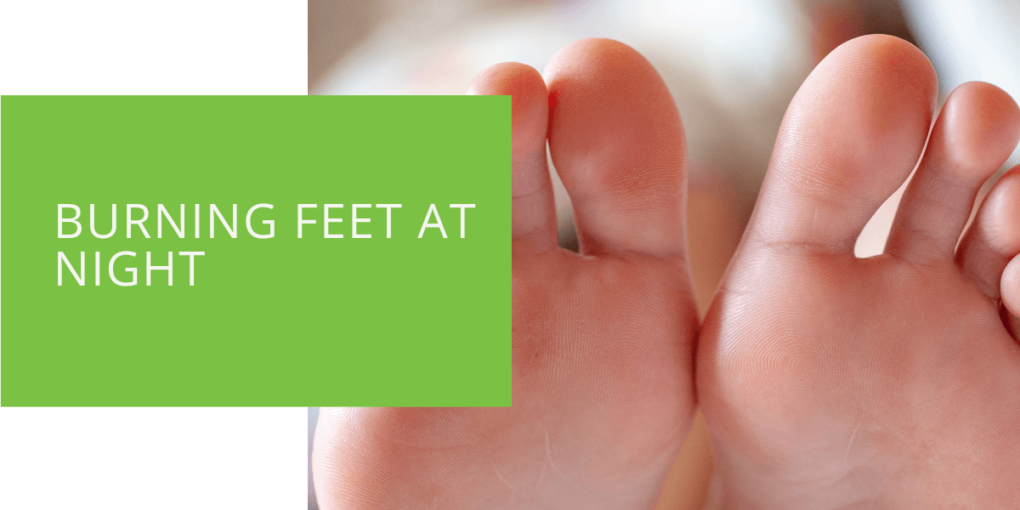Understanding and Treating Burning Feet at Night
Do you experience a distressing burning sensation in your feet, particularly at night? Burning feet can be an uncomfortable and frustrating symptom that affects many individuals. This sensation can disrupt sleep and impair daily activities, whether it's a mild tingling or intense burning pain. This comprehensive guide will delve into the causes of burning feet, explore why symptoms may worsen at night, discuss treatment options, and provide insights into diagnosing and managing this condition. By understanding the underlying causes and implementing effective strategies, you can find relief and regain control over your foot health.
Causes of Burning Feet
Experiencing a burning sensation in your feet can be a distressing symptom, often associated with various underlying causes. Some common causes of burning feet include:
Peripheral Neuropathy
Peripheral neuropathy is nerve damage that affects the peripheral nerves, often leading to burning sensations, tingling, and foot pain. Conditions such as diabetes, vitamin deficiency, and exposure to toxins can contribute to peripheral neuropathy.
Tarsal Tunnel Syndrome
Tarsal tunnel syndrome occurs when the tibial nerve, which runs through a narrow passage in the ankle, becomes compressed or damaged. This compression can cause a burning sensation, pain, and tingling in the foot.
Fungal Infections
Fungal infections, such as athlete's foot, can cause burning and itching sensations in the feet. The condition may result in inflammation and irritation of the skin, leading to discomfort.
Small Fiber Neuropathy
Small fiber neuropathy affects the small nerve fibers responsible for transmitting sensations. When these fibers are damaged or impaired, individuals may experience a burning sensation, typically starting in the feet and gradually progressing to the legs.
Understanding Why Feet Get Worse at Night
Many people with burning feet notice that the discomfort intensifies during the night. Several factors can contribute to this aggravation, including:
Decreased Distraction
During the day, engaging in activities and being on your feet can provide distractions from the burning sensation. However, when you're at rest during the night, the focus on your feet increases, making the burning sensation more noticeable.
Reduced Blood Flow
Blood flow to the extremities tends to decrease when lying down, which can exacerbate the symptoms of burning feet. Insufficient blood supply may contribute to nerve dysfunction and intensify the burning sensation.
Peripheral Neuropathy Patterns
Peripheral neuropathy often manifests with a characteristic pattern, causing symptoms to be more pronounced in the evening and at night. This pattern is believed to be influenced by the body's natural circadian rhythms and may be related to the body's overall fatigue and stress levels.

Treatment Options for Burning Feet
Home Remedies for Alleviating Symptoms
- Soaking your feet in cool water or using cold compresses can temporarily relieve the burning sensation.
- Maintaining good foot hygiene, wearing comfortable shoes, and avoiding exposure to extreme temperatures can help alleviate discomfort.
- Massaging your feet and applying moisturizing creams can also provide soothing effects.
Medical Treatments for Burning Feet
- Medications such as pain relievers, anticonvulsants, and antidepressants may be prescribed to manage neuropathic pain and reduce the burning sensation.
- Topical creams or patches containing capsaicin, a compound found in chili peppers, can provide temporary relief by desensitizing the nerves.
- In some cases, nerve blocks or nerve stimulation techniques may be recommended to alleviate the burning sensation.
Lifestyle Modifications to Manage Symptoms
- Managing underlying conditions such as diabetes, vitamin deficiencies, or thyroid disorders can help prevent or control peripheral neuropathy.
- Regular exercise, maintaining a healthy weight, and following a balanced diet can contribute to overall nerve health and reduce the risk of complications.
Diagnosing Burning Feet Syndrome
If you experience persistent or worsening burning feet symptoms, seeking professional evaluation is crucial. A healthcare professional or podiatrist will perform a comprehensive assessment, which may include:
Medical History Review
Your medical history, including information about any underlying conditions, recent illnesses, medications, and lifestyle factors, will be considered to identify potential causes of your symptoms.
Physical Examination
A physical examination of your feet and lower legs will be conducted to assess for signs of inflammation, skin conditions, or nerve abnormalities.
Medical Tests and Examinations for Diagnosis
Various tests may be conducted to help diagnose the underlying cause of your burning feet, including blood tests to check for vitamin deficiencies, nerve conduction studies, electromyography (EMG), or skin biopsies to evaluate nerve function and rule out other conditions.
Identifying Underlying Conditions
Identifying and treating the underlying cause of burning feet is essential for effective management. This may involve collaborating with other healthcare professionals to address diabetes, vitamin deficiencies, or fungal infections.
Conclusion
Burning feet at night can significantly impact your quality of life. Understanding the causes and seeking appropriate treatment options is essential for relieving this discomforting sensation. Whether through home remedies, medical treatments, or lifestyle modifications, addressing the underlying causes and managing symptoms can significantly improve your foot health and overall well-being. Consult a podiatrist or healthcare professional for an accurate diagnosis and personalized treatment plan tailored to your needs. Don't let burning feet hinder your quality of life—take proactive steps towards finding relief and restoring comfort.
Key Takeaways
- Peripheral neuropathy, tarsal tunnel syndrome, fungal infections, or small fiber neuropathy can cause burning feet.
- Symptoms of burning feet may worsen at night due to decreased distractions, reduced blood flow, and peripheral neuropathy patterns.
- Treatment options include home remedies, medical interventions, and lifestyle modifications, while a proper diagnosis is essential for effective management.

